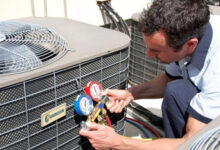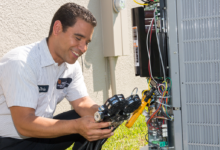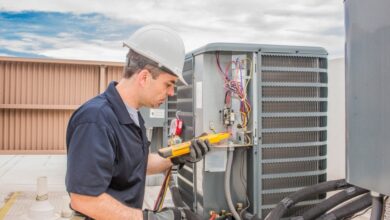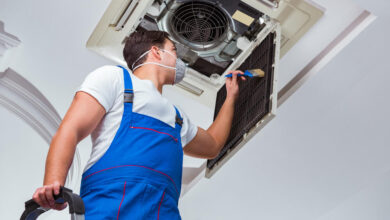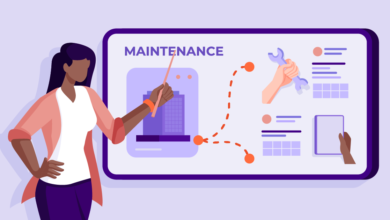Routine AC Maintenance: The Key to a Comfortable and Efficient Home
Sponsored Ads
Introductory Words
In the sweltering heat of summer, a well-maintained air conditioner is the key to a comfortable and inviting home. Routine AC maintenance can extend the lifespan of your unit, prevent costly repairs, and ensure optimal cooling performance. By following a regular maintenance schedule, you can keep your AC running smoothly and efficiently, ensuring a cool and comfortable living environment all season long. In this comprehensive guide, we will delve into the benefits, methods, and importance of routine AC maintenance, providing you with the knowledge and tools you need to keep your cooling system operating at its best.
Air conditioners, like any other mechanical system, require regular care and maintenance to operate efficiently and effectively. Neglecting routine maintenance can lead to a host of problems, including reduced cooling capacity, increased energy consumption, and premature failure. In contrast, a well-maintained AC system provides numerous benefits, making it a worthwhile investment in your home comfort and energy efficiency.
Benefits of Routine AC Maintenance
Enhanced Cooling Performance
Regular maintenance ensures that your AC unit is operating at its peak efficiency, delivering optimal cooling performance. By cleaning the coils, filters, and other components, maintenance technicians remove dirt, dust, and debris that can impede airflow and reduce cooling capacity. A clean and well-maintained AC system will distribute cool air more evenly throughout your home, providing a comfortable and refreshing environment.
Increased Energy Efficiency
A properly maintained AC system consumes less energy to achieve the desired cooling effect. By addressing issues such as refrigerant leaks, clogged filters, and worn components, maintenance technicians can improve the efficiency of your unit, resulting in lower energy bills and a reduced carbon footprint. An efficient AC system not only saves you money but also contributes to environmental sustainability.
Extended Lifespan
Routine maintenance can significantly extend the lifespan of your AC unit. By catching and addressing potential problems early on, maintenance technicians can prevent minor issues from escalating into major breakdowns. Additionally, regular maintenance helps to keep the components of your AC system clean and lubricated, reducing wear and tear and prolonging its overall lifespan.
Reduced Repair Costs
Regular AC maintenance can help you avoid costly repairs in the long run. By identifying and addressing potential issues before they become major problems, maintenance technicians can prevent the need for expensive repairs or premature replacement of your AC unit. A well-maintained AC system is less likely to experience breakdowns or require extensive repairs, saving you money and hassle.
Improved Indoor Air Quality
Regular AC maintenance not only enhances cooling performance but also improves indoor air quality. By cleaning the filters and coils, maintenance technicians remove allergens, dust, and other pollutants that can circulate through your home. A clean AC system helps to reduce respiratory problems, allergies, and other health issues, creating a healthier and more comfortable living environment.
Methods of Routine AC Maintenance
Regular Inspection and Cleaning
Regular inspections and cleaning are essential for maintaining the optimal performance of your AC unit. Maintenance technicians will thoroughly inspect the unit, checking for any signs of damage or wear. They will also clean the coils, filters, and other components to remove dirt, dust, and debris that can impede airflow and reduce cooling capacity.
Refrigerant Level Check
Refrigerant is a vital component of an AC system, responsible for absorbing heat from the air inside your home. Maintenance technicians will check the refrigerant level and add refrigerant as needed to ensure optimal cooling performance. Low refrigerant levels can compromise the efficiency and cooling capacity of your AC unit.
Electrical Components Inspection
The electrical components of your AC system, including the compressor, fan motor, and wiring, play a crucial role in its operation. Maintenance technicians will inspect the electrical components for any signs of damage, loose connections, or corrosion. They will also check the voltage and amperage to ensure that the unit is receiving the correct power.
Ductwork Inspection and Cleaning
The ductwork is responsible for distributing cool air throughout your home. Maintenance technicians will inspect the ductwork for any leaks, blockages, or damage that could impede airflow. They will also clean the ductwork to remove dust and debris that can reduce cooling efficiency and contribute to poor indoor air quality.
Strengths and Weaknesses of Routine AC Maintenance
Strengths
Improved Cooling Performance
Regular AC maintenance ensures that your unit operates at its peak efficiency, delivering optimal cooling performance. By cleaning the coils, filters, and other components, maintenance technicians remove dirt, dust, and debris that can impede airflow and reduce cooling capacity. A clean and well-maintained AC system will distribute cool air more evenly throughout your home, providing a comfortable and refreshing environment.
Increased Energy Efficiency
A properly maintained AC system consumes less energy to achieve the desired cooling effect. By addressing issues such as refrigerant leaks, clogged filters, and worn components, maintenance technicians can improve the efficiency of your unit, resulting in lower energy bills and a reduced carbon footprint. An efficient AC system not only saves you money but also contributes to environmental sustainability.
Extended Lifespan
Routine maintenance can significantly extend the lifespan of your AC unit. By catching and addressing potential problems early on, maintenance technicians can prevent minor issues from escalating into major breakdowns. Additionally, regular maintenance helps to keep the components of your AC system clean and lubricated, reducing wear and tear and prolonging its overall lifespan.
Weaknesses
Time and Cost
Routine AC maintenance requires time and money. Maintenance technicians typically charge a fee for their services, and the cost of maintenance can vary depending on the size and complexity of your AC system. Additionally, it takes time for maintenance technicians to inspect and service your unit, which may require you to take time off work or adjust your schedule.
Potential for Misdiagnosis
While routine AC maintenance is generally beneficial, there is a potential for misdiagnosis or incorrect repairs. Maintenance technicians may not always be able to accurately identify or fix problems with your AC system, which can lead to further issues or even damage to your unit. It is important to choose a reputable and experienced HVAC company for your maintenance needs to minimize the risk of misdiagnosis.
| Maintenance Task | Frequency | Benefits |
|---|---|---|
| Filter Cleaning | Monthly | Improves airflow, reduces energy consumption, extends AC lifespan |
| Coil Cleaning | Annually or as needed | Enhances cooling performance, improves efficiency, prevents corrosion |
| Refrigerant Level Check | Annually or as needed | Ensures optimal cooling capacity, prevents premature failure |
| Electrical Components Inspection | Annually or as needed | Identifies potential electrical hazards, prevents costly repairs, ensures safe operation |
| Ductwork Inspection and Cleaning | Every 3-5 years | Improves airflow, reduces energy consumption, enhances indoor air quality |
FAQs
1. How often should I have my AC maintained?
It is recommended to have your AC maintained at least once a year, preferably before the start of the cooling season. If you use your AC frequently or live in a dusty or humid environment, more frequent maintenance may be necessary.
2. What are the signs that my AC needs maintenance?
Signs that your AC may need maintenance include reduced cooling capacity, increased energy consumption, unusual noises, strange odors, or frequent breakdowns.
3. Can I perform routine AC maintenance myself?
Some basic maintenance tasks, such as cleaning the filters, can be performed by homeowners. However, it is generally recommended to hire a qualified HVAC technician for more complex maintenance tasks, such as coil cleaning, refrigerant level checks, and electrical inspections.
4. How much does routine AC maintenance cost?
The cost of routine AC maintenance can vary depending on the size and complexity of your unit, as well as the location and availability of HVAC technicians. It is important to get quotes from multiple HVAC companies before making a decision.
5. What happens if I neglect routine AC maintenance?
Neglecting routine AC maintenance can lead to a host of problems, including reduced cooling capacity, increased energy consumption, premature failure, costly repairs, and poor indoor air quality.
Conclusion
The Importance of Routine AC Maintenance
Routine AC maintenance is essential for maximizing the comfort, efficiency, and lifespan of your cooling system. By following a regular maintenance schedule, you can enjoy a cool and comfortable home environment, reduce your energy consumption,



